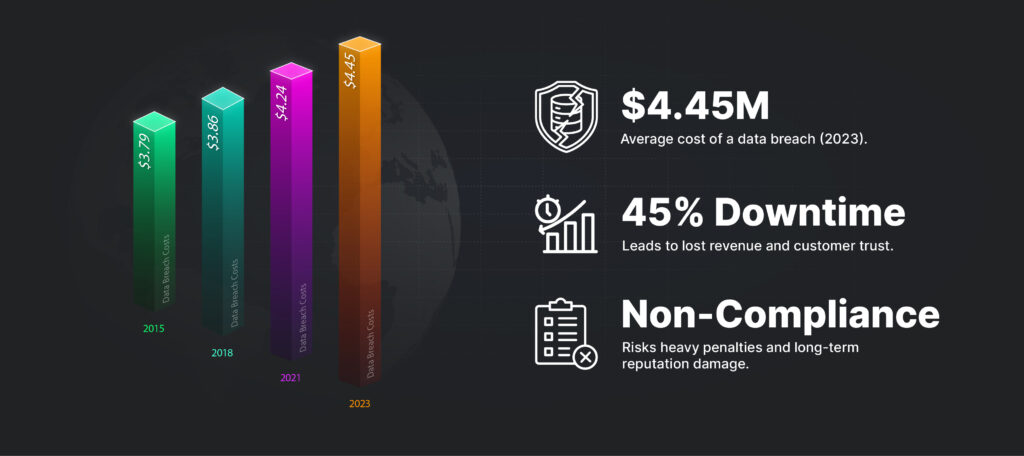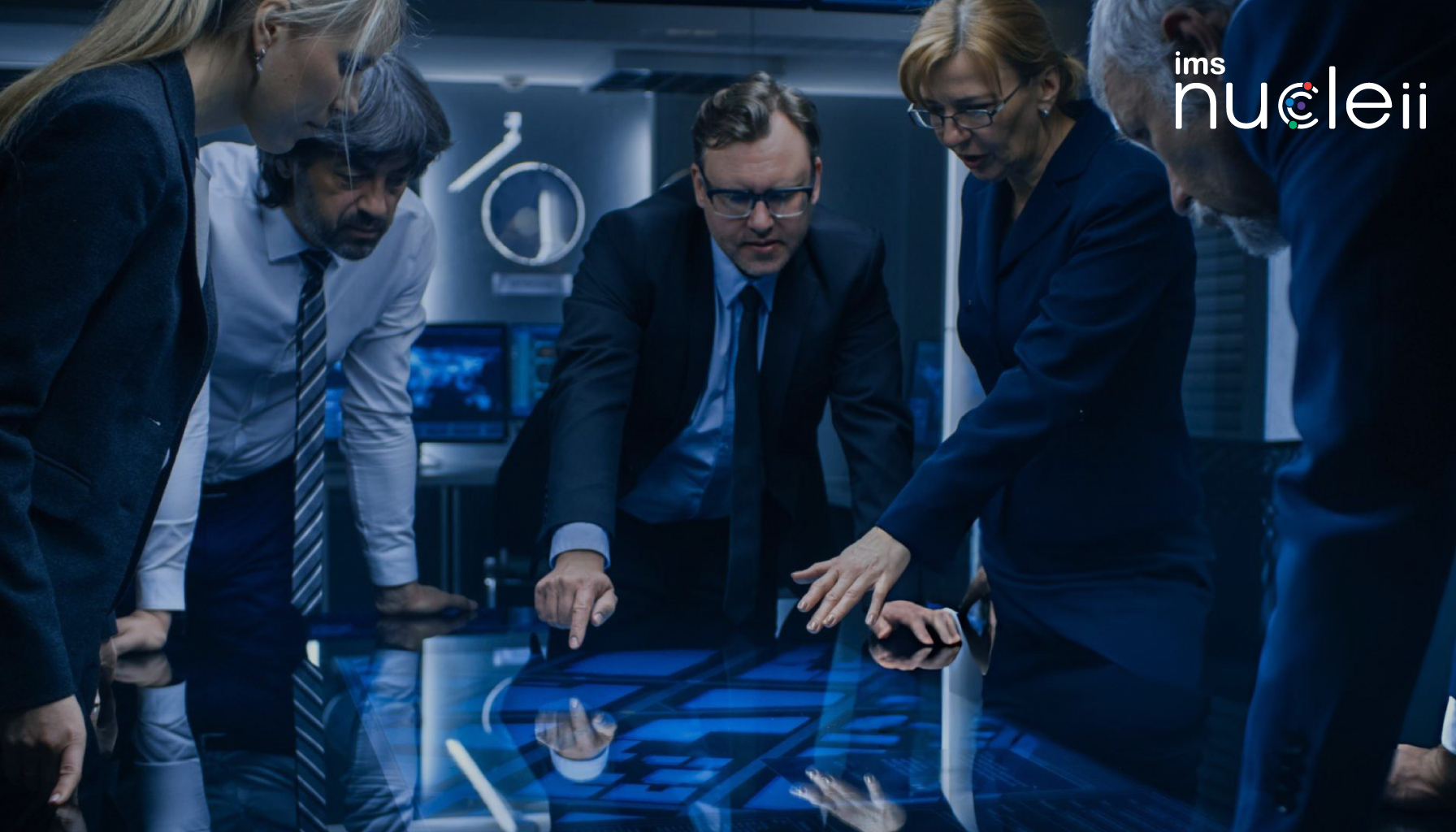Cyber threats are rapidly becoming the headlines across all businesses, regardless of their size. What was good as a disaster recovery plan to start with, is no longer effective as cyber attacks have evolved in nature and complexity, requiring organizations to be proactive instead of reactive.
In such a scenario, cyber resilience becomes a crucial strategy for businesses. It involves not just preparing for an attack but fostering an adaptable and robust operational framework that ensures business continuity. Cyber resilience is essentially an immune system for enterprises that enables them to withstand and recover from cyber incidents effectively.
Ready to learn why now is the time to rethink your disaster recovery strategy? Let’s dive into what makes cyber resilience so essential and how MSPs can make the transition smoother than you think.
What Is Cyber Resilience?
Preparedness, response, and the ability to recover from disruptive cyberattacks against any organization are key components of cyber resilience. It is an integration strategy. And unlike classic disaster recovery, its idea is to decrease the risk of attack occurrences to a large extent. During the attack event, it helps reduce the scale of an impact.
Why Cyber Resilience Matters

Today’s businesses ought to operate in an environment rife with sophisticated cyber threats, from ransomware and phishing attacks to vulnerabilities in the supply chain.
Data breaches and downtime can be a disaster of financial and reputational magnitude:
- Financial Losses: The average data breach cost increased to $4.45 million in 2023, according to IBM’s Cost of a Data Breach Report.
- Operational Disruptions: Downtime impacts service delivery, thus resulting in lost revenue and dissatisfaction with the customer.
- Regulatory Consequences: In case of non-compliance with data protection regulations like GDPR or CCPA, there might be expensive fines and legal disputes.
Cyber resilience addresses these issues by promoting an active, layered defensive posture. It ensures businesses are not reactive to threats but capable of holding out against them.
The Role of Managed Service Providers (MSPs)
The fact is, with organizations pushing toward better cyber resilience, the role of MSPs is becoming pretty critical. As cyber threats grow in sophistication, so do the service portfolios of the MSPs, not only augmenting security but ensuring business continuity and compliance too.
Key Services Offered by MSPs are:
Threat Monitoring
MSPs continuously monitor their IT infrastructures for emerging threats and vulnerabilities, which enables them to act promptly when risks are found. This proactive approach helps organizations stay ahead of cyber adversaries and minimizes the potential damage from such attacks.
Incident Response
MSPs bear the responsibility of the recovery from cyber attacks. They will work with the business to find out how the breach occurred, how the damage done could be repaired, and how to prevent the next attacks. All these are crucial to recover in the shortest time possible to ensure minimum downtime and operational disruption.
Security Awareness Training
Training programs, therefore, need to be holistic and address common threats like phishing. MSPs train employees regularly so that they can recognize and respond to cyber threats effectively.
Backup and Disaster Recovery Solutions
MSPs possess strong backup strategies, which give them the capacity to very quickly restore data in such cases as ransomware attacks in order to maintain business continuity and protect important data.
Regulatory Compliance Support
Organizations struggle because of the complexity of their regulatory environments. This can work to the advantage of the MSPs as they ensure the client is aligned with GDPR or HIPAA, avoid penalties, and keep data safe.
Vulnerability scans and security auditing
Regular assessments help identify gaps in security measures, allowing organizations to strengthen their defenses proactively. MSPs conduct audits to ensure that cybersecurity practices remain effective against evolving threats.
By partnering with MSPs, organizations gain access to advanced technologies and expertise without the need for significant upfront investments.
How MSPs Enhance Cyber Resilience
In return, MSPs provide various contributions toward cyber resilience:
- Proactive Threat Mitigation: This proactively mitigates threats using advanced tools and intelligence through identifying and addressing vulnerabilities before exploitation.
- Data Backup and Recovery Solutions: Secure, reliable data backup systems in place through MSPs are necessary for integrity and the fastest possible recovery.
- Advanced Technology Integration: They embrace the latest trend of AI-based threat detection and zero-trust architecture to leverage the highest advanced technologies available.
Key Elements of a Cyber Resilient Strategy
Cyber resilience requires a multi-faceted approach. The following are the key components:
1. Proactive Threat Mitigation
Anticipation and preparing to handle threats once they strike will form the foundation for cyber resilience:
- Conducting regular risk assessments to identify vulnerabilities.
- Deploying advanced threat detection tools like endpoint detection and response (EDR) solutions.
- Educate employees on best practices for cybersecurity to reduce human error.
2. Advanced Technology Utilization
Modern technology is of extreme importance in defense against the present cyber threats. The technologies involved are:
- Artificial Intelligence (AI): AI-based systems can analyze huge chunks of data to identify patterns and predict possible threats.
- Automation: Automated responses to identified threats reduce response times and mitigate potential damage.
- Zero Trust Architecture: These models limit the unauthorized access of threats to applications and services by verifying each access request.
3. Strategic Backup Solutions
Backups are a key protection measure against data loss and ransomware attacks. Successful backup strategies include:
- Maintaining multiple backup copies, both offsite and cloud-based.
- Regularly testing backups to ensure data integrity and recovery reliability.
- This demands one to implement immutable backups, which attackers cannot delete or modify.
Aligning Cyber Resilience with Business Goals
Cyber resilience has gone beyond being named purely as a technology area and has become a fundamental necessity to ensure effective business delivery. The role of cyber resilience within these critical areas is discussed below:
1. Business Continuity
Keeping operations running smoothly is non-negotiable when disruptions happen—whether from a cyberattack or another unexpected event. That’s where the cyber resilience role comes in. A company could continue providing its service even in cyber events by applying the proper measures. An effective cyber resilience strategy also guarantees a rapid recovery, thereby diminishing downtime and lessening the repercussions on routine operations.
2. Regulatory compliance
Cyber laws and regulations are increasingly stringent, and cyber resilience will help organizations to comply with these demands.
- Meeting Legal Standards: It is a given fact that various sectors are now obliged to put in place business continuity plans that focus on cyber threats. Cyber resilience ensures businesses maintain compliance with these objectives.
- Proving Capabilities: In the financial services sector, for example, regulations such as DORA require companies to demonstrate their ability to operate effectively during cyber crises.
It’s not about checking boxes but defending what matters:
- Ensuring Data Security: Cyber resilience entails robust data protection as stipulated in privacy laws and standards.
- Establishing Trust: When companies want to protect private information, they establish their trust among the people and stakeholders.
3. Safeguarding Your Reputation
The company’s reputation might take years to build, but it can take only a few moments to get destroyed. Cyber resilience can be pivotal in maintaining such hard-won trust. An adequately prepared business will recover faster from cyber incidents, reducing the losses in terms of finance and reputation. When customers see that a company can recover quickly after attacks, they will more likely stick to that company.
Effective communication and culture also play a key role. Providing clear and transparent updates regarding cybersecurity initiatives significantly contributes to the preservation of trust. Additionally, timely updates also ensure that employees understand and prioritize security in the organization, indicating to stakeholders that the organization takes its responsibilities seriously.
Cyber Threats aren’t Going Anywhere
They’re only getting more sophisticated. Moving from traditional disaster recovery to a more proactive cyber resilience strategy isn’t just a good idea—it’s an absolute necessity.
When prioritizing resilience, you’re not just protecting your business from interruptions. You’re also safeguarding your reputation, maintaining customer trust, and setting yourself up for long-term success.
Partnering with Managed Service Providers makes this journey a whole lot easier. They bring the expertise, advanced tools, and 24/7 support to tackle today’s complex cybersecurity challenges. And the best part? They’ll help you navigate this ever-changing landscape without breaking the bank.
So, here’s the bottom line: It’s time to rethink how your organization handles disruptions. Take action, reassess your strategies, and explore how MSPs can be your secret weapon in building cyber resilience.
At IMS Nucleii, we work with businesses of all sizes to help them strengthen their security posture through our comprehensive suite of cybersecurity services.
Contact us to learn more about how we can work together.











